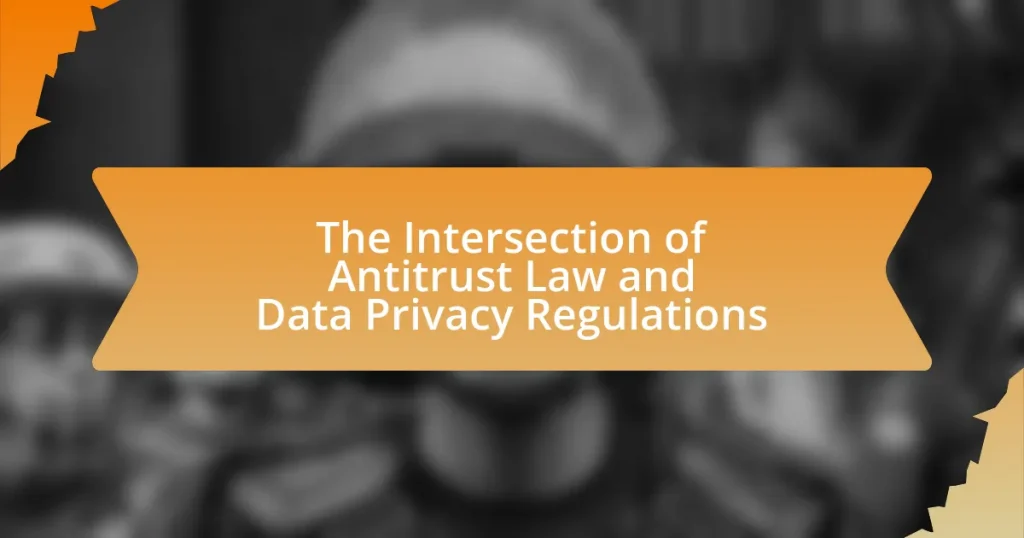The article focuses on recent trends in antitrust enforcement actions against big tech companies, highlighting increased regulatory scrutiny in the United States and Europe aimed at addressing monopolistic practices and anti-competitive behavior. It discusses the evolution of antitrust actions, key factors driving this increase, and the varying approaches across different jurisdictions. The article also examines the implications of these enforcement actions for consumers and businesses, the types of cases being pursued, and the strategies employed by big tech firms to navigate regulatory challenges. Additionally, it outlines future trends in antitrust enforcement, including the potential impact of emerging technologies and the importance of international cooperation in addressing anti-competitive practices.

What are Recent Trends in Antitrust Enforcement Actions Against Big Tech Companies?
Recent trends in antitrust enforcement actions against big tech companies include increased scrutiny from regulators, particularly in the United States and Europe, focusing on monopolistic practices and anti-competitive behavior. For instance, the U.S. Department of Justice and several state attorneys general have initiated lawsuits against major firms like Google and Facebook, alleging that they engage in practices that stifle competition and harm consumers. Additionally, the European Union has ramped up its regulatory efforts, imposing significant fines on companies such as Google for anti-competitive practices, with fines totaling over €8 billion in recent years. These actions reflect a broader global movement towards stricter antitrust regulations aimed at curbing the market power of large technology firms.
How have antitrust enforcement actions evolved in recent years?
Antitrust enforcement actions have intensified in recent years, particularly against major technology companies. Regulatory bodies, such as the Federal Trade Commission and the European Commission, have increased scrutiny and initiated more investigations into anti-competitive practices, reflecting a shift towards a more aggressive enforcement stance. For instance, in 2020, the U.S. Department of Justice filed a landmark lawsuit against Google, alleging monopolistic behavior in search and advertising markets, marking a significant escalation in antitrust actions. Additionally, the European Union has imposed hefty fines on companies like Facebook and Apple for violations of competition laws, demonstrating a global trend towards stricter enforcement. This evolution indicates a growing recognition of the need to address the market power of large tech firms and ensure fair competition.
What key factors have influenced the increase in antitrust actions?
The key factors influencing the increase in antitrust actions include heightened public concern over monopolistic practices, aggressive market consolidation by major tech companies, and evolving regulatory frameworks. Public scrutiny has intensified as consumers and advocacy groups raise awareness about the negative impacts of monopolies on competition and innovation. Additionally, significant mergers and acquisitions in the tech sector have prompted regulators to take a closer look at potential anti-competitive behavior. For instance, the Federal Trade Commission and the Department of Justice have ramped up investigations and lawsuits against companies like Google and Facebook, citing violations of antitrust laws. This shift reflects a broader trend towards stricter enforcement, as evidenced by the increase in antitrust cases filed, which rose from 20 in 2019 to over 40 in 2021, highlighting a proactive stance by regulatory bodies.
How do these trends differ across various jurisdictions?
Antitrust enforcement trends against big tech companies vary significantly across jurisdictions, primarily influenced by local regulatory frameworks and political climates. For instance, the European Union has adopted a more aggressive stance, implementing the Digital Markets Act to ensure fair competition, while the United States has seen a fragmented approach, with states like California pursuing their own antitrust actions alongside federal initiatives. In contrast, jurisdictions such as China have focused on rapid regulatory changes to curb monopolistic practices, as evidenced by the fines imposed on companies like Alibaba and Tencent. These differences highlight how cultural, economic, and legal factors shape the enforcement landscape in each region.
Why is antitrust enforcement important for Big Tech companies?
Antitrust enforcement is important for Big Tech companies because it promotes competition and prevents monopolistic practices that can harm consumers and innovation. By regulating these companies, authorities aim to ensure a level playing field, which can lead to better services, lower prices, and increased choices for consumers. For instance, the U.S. Department of Justice and several states have initiated lawsuits against major tech firms like Google and Facebook, citing concerns over their market dominance and anti-competitive behavior. These actions underscore the necessity of antitrust measures to maintain market integrity and protect consumer interests.
What are the potential consequences of antitrust violations for these companies?
Antitrust violations can lead to significant financial penalties, operational restrictions, and reputational damage for companies involved. For instance, the Federal Trade Commission (FTC) and the Department of Justice (DOJ) can impose fines that may reach billions of dollars, as seen in cases against companies like Google and Facebook, where fines have exceeded $5 billion. Additionally, companies may face injunctions that limit their business practices, such as restrictions on mergers or acquisitions, which can hinder growth and innovation. Furthermore, public scrutiny and negative media coverage can damage a company’s reputation, leading to loss of consumer trust and potential declines in market share. These consequences underscore the serious implications of non-compliance with antitrust laws.
How do antitrust actions impact competition and innovation in the tech industry?
Antitrust actions significantly impact competition and innovation in the tech industry by promoting a more level playing field and encouraging new entrants. These legal measures aim to prevent monopolistic practices, which can stifle competition and limit consumer choices. For instance, the U.S. Department of Justice’s lawsuit against Google in 2020 highlighted concerns over its dominance in online search and advertising, asserting that such control hinders competition and innovation by making it difficult for smaller companies to compete effectively. Historical data shows that increased competition often leads to greater innovation, as companies strive to differentiate themselves and capture market share. Therefore, antitrust actions can foster an environment where innovation thrives, benefiting consumers and the overall market.
What are the main types of antitrust enforcement actions currently being pursued?
The main types of antitrust enforcement actions currently being pursued include merger challenges, monopolization claims, and conduct investigations. Merger challenges involve scrutiny of proposed mergers that may reduce competition, as seen in cases like the attempted merger between Sprint and T-Mobile, which faced significant regulatory hurdles. Monopolization claims target companies that abuse their market power to stifle competition, exemplified by ongoing investigations into Google and Facebook for their market dominance. Conduct investigations assess anti-competitive practices, such as price-fixing or exclusionary tactics, with notable cases involving Amazon’s treatment of third-party sellers. These actions reflect a growing regulatory focus on maintaining competitive markets, particularly in the technology sector.
What role do mergers and acquisitions play in antitrust scrutiny?
Mergers and acquisitions play a critical role in antitrust scrutiny by serving as focal points for regulatory examination of market competition. Regulatory bodies, such as the Federal Trade Commission and the Department of Justice in the United States, assess proposed mergers and acquisitions to determine their potential impact on market concentration and consumer welfare. For instance, the merger between T-Mobile and Sprint faced significant scrutiny due to concerns that it would reduce competition in the telecommunications market, ultimately leading to higher prices and fewer choices for consumers. This scrutiny is particularly pronounced in the context of Big Tech companies, where acquisitions can lead to monopolistic behaviors that stifle innovation and harm consumers. The heightened focus on these transactions reflects a broader trend in antitrust enforcement aimed at preventing anti-competitive practices in rapidly evolving digital markets.
How are monopolistic practices being challenged by regulators?
Regulators are challenging monopolistic practices through increased antitrust enforcement actions, particularly against major technology companies. For instance, the U.S. Department of Justice and several state attorneys general have filed lawsuits against companies like Google and Facebook, alleging anti-competitive behavior that stifles competition and harms consumers. In 2020, the DOJ sued Google for maintaining its search engine monopoly through exclusionary contracts, while in 2021, the Federal Trade Commission initiated a lawsuit against Facebook for its acquisitions of Instagram and WhatsApp, arguing that these actions were intended to eliminate competition. These legal actions reflect a broader trend of regulatory scrutiny aimed at promoting market competition and protecting consumer interests.
How do recent antitrust actions reflect broader societal concerns?
Recent antitrust actions against big tech companies reflect broader societal concerns about market monopolization and consumer welfare. These actions highlight fears that dominant firms stifle competition, limit innovation, and exploit consumer data, leading to calls for regulatory intervention. For instance, the U.S. Department of Justice’s lawsuit against Google in 2020 aimed to address concerns over its search engine dominance, which critics argue harms smaller competitors and restricts consumer choice. Additionally, public sentiment has shifted towards favoring stricter regulations, as evidenced by surveys indicating that a majority of Americans believe big tech companies hold too much power. This growing awareness of the implications of monopolistic practices underscores the societal demand for a fairer digital marketplace.
What implications do these trends have for consumers and businesses?
Recent trends in antitrust enforcement actions against big tech companies imply increased scrutiny and potential regulatory changes that can significantly impact both consumers and businesses. For consumers, these trends may lead to enhanced competition, resulting in better prices, improved services, and greater innovation as companies strive to differentiate themselves in a less monopolistic environment. For businesses, particularly smaller firms, these actions can create a more level playing field, allowing them to compete more effectively against dominant players. Additionally, businesses may face new compliance requirements and operational adjustments as regulations evolve, which could increase costs and reshape market strategies. The Federal Trade Commission’s recent lawsuits against major tech firms illustrate this shift, highlighting the potential for substantial changes in market dynamics.

What specific cases exemplify recent antitrust enforcement actions against Big Tech?
Recent antitrust enforcement actions against Big Tech are exemplified by the lawsuits filed against Google and Facebook. In 2020, the U.S. Department of Justice initiated a landmark antitrust lawsuit against Google, alleging that the company engaged in anti-competitive practices to maintain its dominance in online search and advertising. This case highlighted Google’s control over search engine market share, which was reported to be over 90%. Similarly, in 2021, the Federal Trade Commission and several states filed a lawsuit against Facebook, accusing it of anti-competitive behavior by acquiring potential rivals like Instagram and WhatsApp to eliminate competition. These cases reflect a growing scrutiny of Big Tech’s market power and practices.
Which companies have faced the most significant antitrust challenges recently?
Google, Amazon, Apple, and Meta have faced the most significant antitrust challenges recently. Google has been scrutinized for its dominance in online advertising and search, leading to lawsuits from the U.S. Department of Justice and several states. Amazon has encountered investigations regarding its marketplace practices and treatment of third-party sellers, prompting scrutiny from both U.S. and European regulators. Apple has faced challenges related to its App Store policies and alleged anti-competitive behavior, particularly concerning its payment systems. Meta, formerly Facebook, has been investigated for its acquisitions and data privacy practices, raising concerns about its market power in social media. These companies are central to ongoing discussions about antitrust enforcement in the tech sector.
What were the outcomes of notable antitrust cases against these companies?
Notable antitrust cases against big tech companies have resulted in significant legal and financial consequences. For instance, the U.S. Department of Justice’s case against Microsoft in the late 1990s led to a settlement that imposed restrictions on Microsoft’s business practices and required it to share its application programming interfaces with third-party developers. Similarly, the European Commission’s antitrust ruling against Google in 2017 resulted in a record fine of €2.42 billion for favoring its own shopping service in search results, alongside mandates to change its advertising practices. These outcomes illustrate the increasing scrutiny and regulatory actions aimed at curbing anti-competitive behavior in the tech industry.
How have these cases influenced public perception of Big Tech?
Recent antitrust enforcement actions against Big Tech companies have significantly shifted public perception, leading to increased skepticism and concern regarding their market power and ethical practices. High-profile cases, such as the lawsuits against Google and Facebook, have highlighted issues like monopolistic behavior and data privacy violations, prompting a growing belief among the public that these companies prioritize profit over consumer welfare. According to a 2021 Pew Research Center survey, 72% of Americans expressed concern about the power and influence of major technology companies, reflecting a notable rise in public wariness. This scrutiny has fueled calls for stricter regulations and greater accountability, indicating a fundamental change in how society views the role and responsibilities of Big Tech in everyday life.
What strategies are Big Tech companies employing to navigate antitrust scrutiny?
Big Tech companies are employing several strategies to navigate antitrust scrutiny, including lobbying efforts, legal defenses, and restructuring business practices. For instance, companies like Google and Facebook have increased their lobbying expenditures significantly, spending over $20 million annually to influence legislation and regulatory outcomes. Additionally, these companies are investing in legal teams to challenge antitrust lawsuits, as seen in cases like the U.S. Department of Justice’s lawsuit against Google, where the company argues that its practices benefit consumers. Furthermore, some firms are restructuring their operations, such as Amazon’s decision to separate its retail and logistics divisions, to address regulatory concerns and demonstrate compliance with antitrust laws. These strategies reflect a proactive approach to mitigate the risks associated with increasing regulatory scrutiny.
How are companies adapting their business practices in response to enforcement actions?
Companies are adapting their business practices in response to enforcement actions by implementing compliance programs, restructuring operations, and enhancing transparency. For instance, following antitrust investigations, major tech firms have increased their focus on regulatory compliance by establishing dedicated teams to monitor adherence to legal standards. Additionally, companies are modifying their algorithms and business models to avoid practices deemed anti-competitive, such as preferential treatment of their own products. A notable example is how Google adjusted its advertising practices after facing scrutiny from regulators, leading to changes in how it displays ads and manages data. These adaptations are aimed at mitigating legal risks and maintaining market competitiveness while aligning with regulatory expectations.
What legal defenses are commonly used in antitrust cases?
Common legal defenses used in antitrust cases include the pro-competitive justification, the efficiency defense, and the necessity defense. The pro-competitive justification argues that certain business practices, while potentially restrictive, ultimately benefit consumers through enhanced competition or innovation. The efficiency defense posits that the practices in question lead to cost savings or efficiencies that outweigh any anti-competitive effects. The necessity defense claims that the actions taken were essential for the business to operate effectively in a competitive market. These defenses are supported by legal precedents, such as the U.S. Supreme Court’s ruling in the 1978 case of Continental T.V., Inc. v. GTE Sylvania Inc., which recognized that certain restrictions could be justified if they promote competition.

What future trends can we expect in antitrust enforcement against Big Tech?
Future trends in antitrust enforcement against Big Tech will likely include increased scrutiny of mergers and acquisitions, more aggressive investigations into anti-competitive practices, and the implementation of new regulatory frameworks. Regulatory bodies, such as the Federal Trade Commission and the European Commission, are expected to adopt a more proactive stance, as evidenced by recent high-profile cases against companies like Google and Facebook. Additionally, there is a growing emphasis on data privacy and market dominance, which may lead to stricter regulations aimed at preventing monopolistic behaviors. The bipartisan support for antitrust reform in the U.S. Congress further indicates a shift towards more rigorous enforcement, as seen in proposed legislation targeting large tech firms.
How might regulatory approaches change in the coming years?
Regulatory approaches are likely to become more stringent and adaptive in the coming years, particularly in response to the growing influence of big tech companies. Governments and regulatory bodies are increasingly focusing on issues such as data privacy, market dominance, and anti-competitive practices. For instance, the European Union’s Digital Markets Act, which aims to ensure fair competition and curb monopolistic behavior, exemplifies this shift towards more proactive regulation. Additionally, the U.S. Federal Trade Commission has signaled intentions to enhance scrutiny of mergers and acquisitions in the tech sector, reflecting a broader trend of heightened antitrust enforcement. These developments indicate a clear trajectory towards more comprehensive and responsive regulatory frameworks aimed at addressing the complexities of the digital economy.
What role will international cooperation play in antitrust enforcement?
International cooperation will play a crucial role in antitrust enforcement by enabling countries to share information, harmonize regulations, and coordinate investigations against multinational corporations. This collaboration is essential as many big tech companies operate across borders, making unilateral enforcement efforts less effective. For instance, the European Union and the United States have increasingly engaged in joint initiatives to tackle anti-competitive practices, exemplified by the 2021 agreement to enhance cooperation on digital market regulations. Such international partnerships facilitate a more comprehensive approach to addressing anti-competitive behavior, ensuring that enforcement actions are not hindered by jurisdictional limitations.
How could emerging technologies impact future antitrust considerations?
Emerging technologies could significantly reshape future antitrust considerations by introducing new market dynamics and competitive behaviors. For instance, advancements in artificial intelligence and machine learning can lead to monopolistic practices through data control and algorithmic pricing, which may require regulators to adapt existing antitrust frameworks. Historical examples, such as the scrutiny faced by Google and Facebook regarding data privacy and market dominance, illustrate how technology can complicate traditional antitrust assessments. As these technologies evolve, regulators may need to develop more nuanced approaches that account for the unique characteristics of digital markets, such as network effects and platform ecosystems, to ensure fair competition.
What best practices can Big Tech companies adopt to mitigate antitrust risks?
Big Tech companies can mitigate antitrust risks by implementing transparent data practices, ensuring compliance with competition laws, and fostering fair competition. Transparent data practices involve clearly communicating how user data is collected, used, and shared, which can help build trust and reduce regulatory scrutiny. Compliance with competition laws requires regular audits and assessments of business practices to identify potential anti-competitive behaviors, such as predatory pricing or exclusive contracts. Fostering fair competition can be achieved by promoting open platforms and allowing third-party developers to access their ecosystems, which can demonstrate a commitment to a competitive marketplace. These practices are supported by regulatory frameworks that emphasize the importance of fair competition and consumer protection, as seen in recent antitrust cases against major tech firms.
How can companies ensure compliance with antitrust laws?
Companies can ensure compliance with antitrust laws by implementing robust compliance programs that include regular training, monitoring, and legal audits. These programs should educate employees about antitrust regulations, identify potential risks, and establish clear reporting mechanisms for antitrust concerns. For instance, the Federal Trade Commission emphasizes the importance of proactive compliance measures, which can help companies avoid violations that lead to significant fines and legal actions. Additionally, companies should consult with legal experts to stay updated on evolving antitrust laws and enforcement trends, particularly in the context of recent scrutiny on big tech firms.
What proactive measures can be taken to foster fair competition?
To foster fair competition, regulatory bodies can implement stricter antitrust laws and enhance enforcement mechanisms. Stricter antitrust laws can prevent monopolistic practices by ensuring that no single company can dominate the market to the detriment of competitors and consumers. For instance, the European Union’s Digital Markets Act aims to create a level playing field for digital services by imposing obligations on major tech platforms to ensure fair access and competition. Enhanced enforcement mechanisms, such as increased funding for antitrust agencies and collaboration with international regulators, can lead to more effective oversight and quicker responses to anti-competitive behaviors. These measures are supported by historical data showing that robust antitrust enforcement leads to increased innovation and consumer choice, as seen in the breakup of monopolies in various industries throughout the 20th century.



